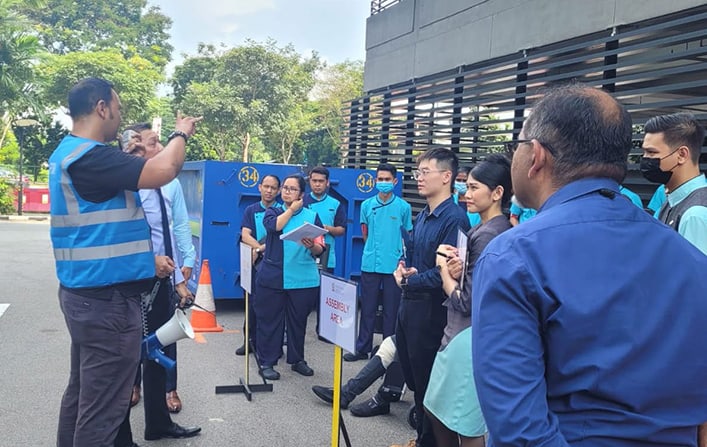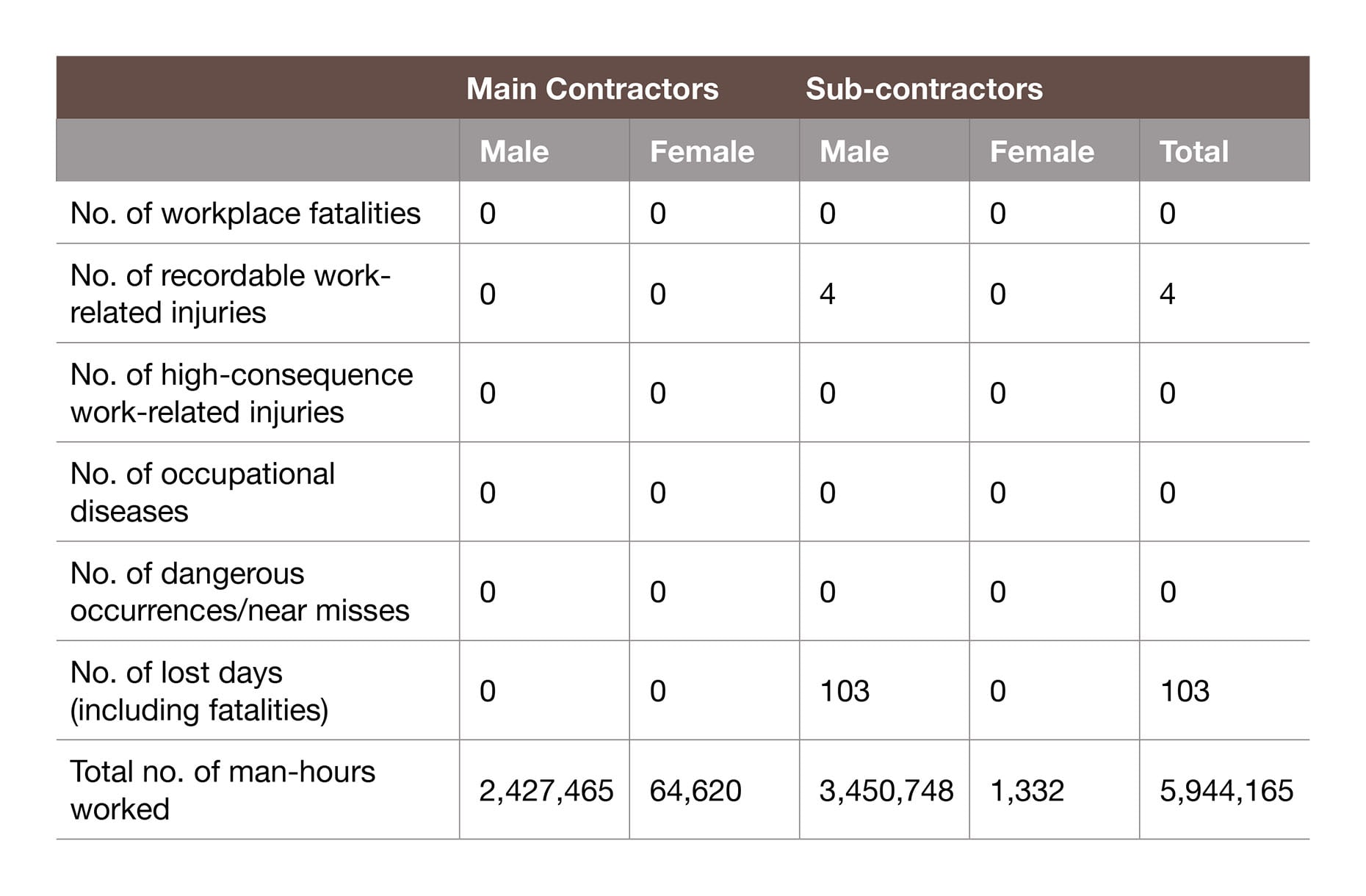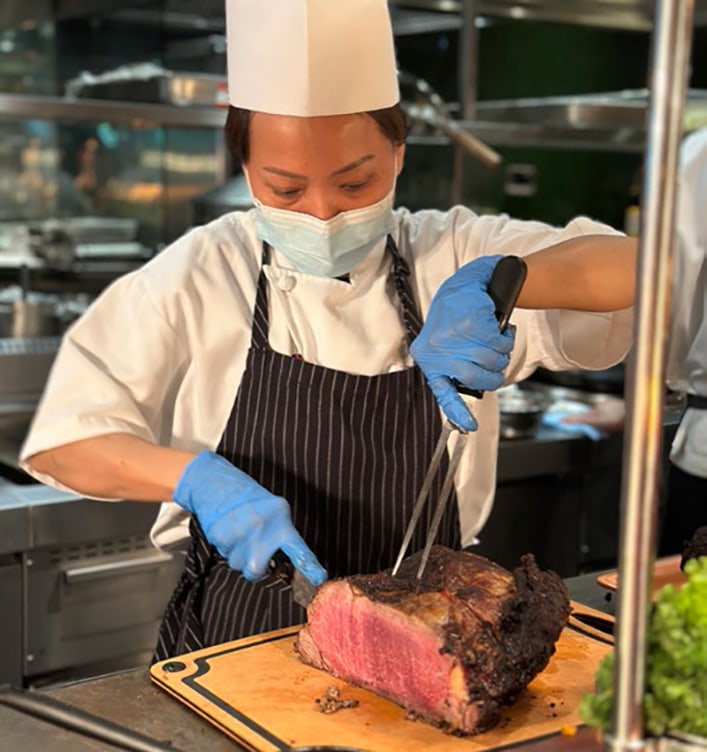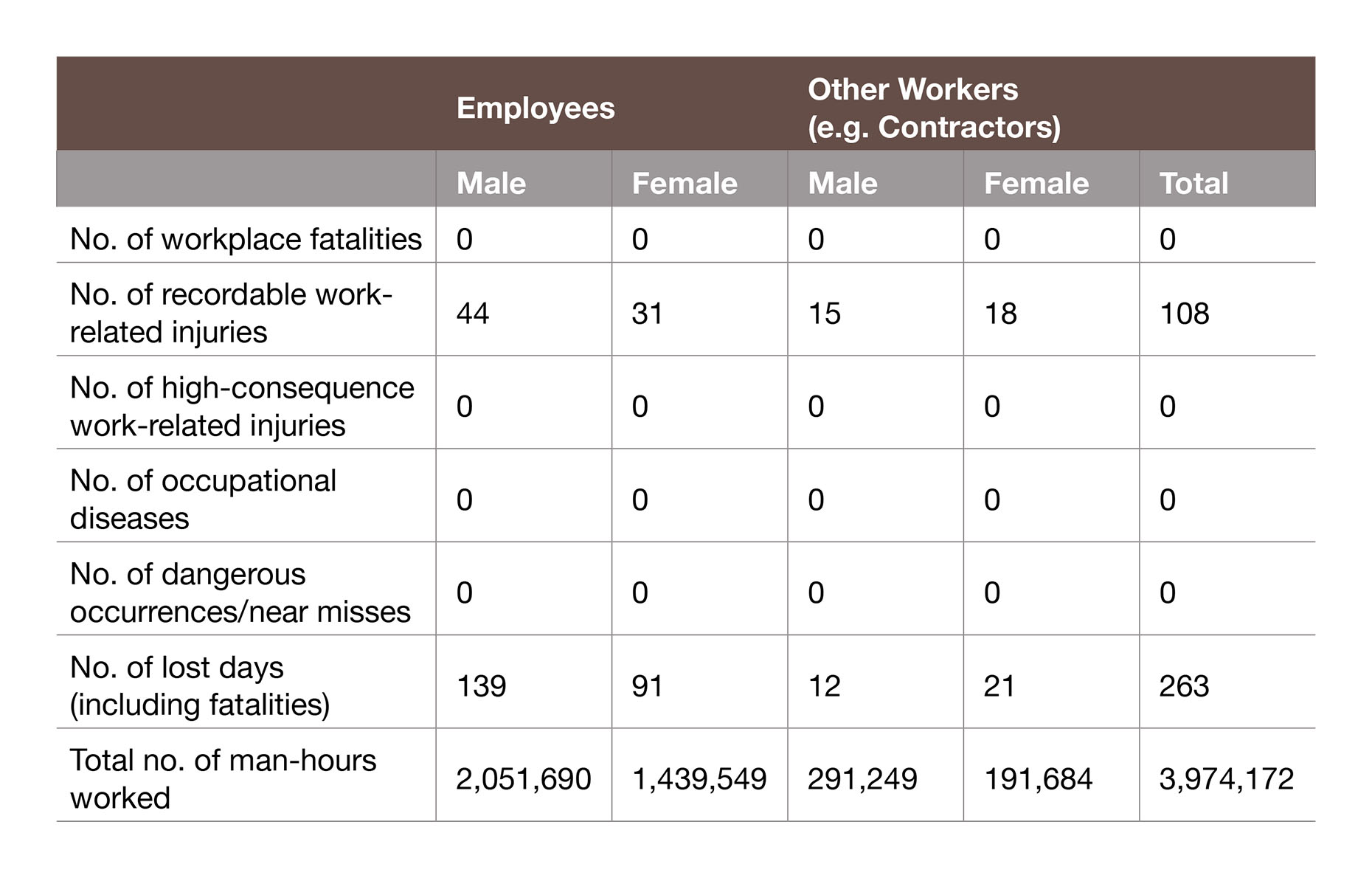Building Good
Health and Safety
UOL views workplace safety and health (WSH) as paramount. We are committed to cultivating an environment that prioritises the safety and health of everyone involved in our business, including employees, contractors, customers and business partners. We strive for zero incidents across our operations.
Our Approach to Health and Safety
In 2024, we updated our WSH policy to enhance the management of workplace safety and health. This revised policy has been communicated to all relevant stakeholders. As part of this update, we strengthened our risk assessment processes, improved operational control through the permit-to-work system, and enhanced incident reporting. Additionally, we achieved bizSAFE Star certification for the Group and obtained ISO 45001 certification for Occupational Health and Safety Management Systems across all our commercial and hospitality properties in Singapore.
Guided by our Occupational Safety and Health Consultation and Participation Management Procedure, we have established channels for employee participation in WSH committees. These channels facilitate open communication, safety concern reporting and regular employee feedback on safety and well-being. The WSH committees meet regularly to review objectives and targets, assess current procedures and explore new safety improvements.
To further encourage engagement, we have set up an anonymous online WSH feedback channel. This allows employees and contractors to share feedback with the Group’s Safety Officer without fear of reprisal.
WSH Management System
The Group has implemented a comprehensive WSH management system aligned with ISO 45001 and the Approved Code of Practice (ACOP) for Chief Executives and Board of Directors. This system includes implementing and monitoring safety measures, tracking and reporting safety incidents, conducting regular safety briefings, site inspections and ongoing reviews of WSH risk assessments and documentation. These efforts guide regular risk assessments to identify hazards and implement appropriate control measures at every level. We continuously evaluate and adapt these measures based on collected data, inspections and employee consultations.

Employees at Pan Pacific Serviced Suites Beach Road participate in a fire evacuation exercise.
Risk assessments are led by trained personnel using a systematic approach that involves examining incident records, inspecting work areas and machinery, and consulting employees. These enhanced risk assessments are prepared in accordance with ISO 45001 and Ministry of Manpower (MOM) guidelines. When practical, upstream risk controls such as engineering controls are adopted and implemented. These risk assessments are regularly communicated to our employees.
For non-routine situations, such as the introduction of new equipment, modifications to the work environment, or significant process changes, a comprehensive risk review is undertaken. This review evaluates potential hazards and identifies necessary mitigation measures. The results of these processes play a vital role in continuously improving our WSH management system and performance metrics. UOL aims to progressively improve safety controls in high-risk areas such as work at height, electrical work and confined spaces. Proper documentation and risk assessments must be completed before starting work. In 2024, UOL implemented the permit-to-work system, which assists in the effective operational control and management of health and safety at work.
Reporting and Responding to Incident
The Group prioritises the prevention of work-related hazards and ill-health through a hierarchy of controls framework, aligned with the MOM’s WSH risk management code of practice. Our robust incident management process ensures that all incidents are thoroughly investigated and corrective actions are implemented. An incident response team investigates reported incidents, develops corrective measures based on the hierarchy of controls, and classifies incidents according to their severity for timely resolution. The findings of these investigations are transparently communicated to all relevant stakeholders.
In 2024, we maintained our target of zero fatalities across all properties and recorded 112 work-related injuries across our development projects and hospitality properties. This was an increase from 86 injuries in 2023.
Development Projects
UOL collaborates closely with our main contractors to maintain a safe environment for all workers involved in our development projects. We require all main contractors to be ISO 45001-certified and ensure that every site has designated safety supervisors and personnel responsible for conducting regular briefings, inspections, and training on worksite safety and related hazards. All main contractors provide their workers with health insurance coverage.
To uphold safety standards, we conduct monthly joint safety inspections at each development project. These inspections are led by our Safety consultant and the Group’s Safety Officer, along with project managers, consultants and main contractors.
Lost Day Rate
To uphold safety standards, we conduct monthly joint safety inspections at each development project. These inspections are led by our Safety consultant and the Group’s Safety Officer, along with project managers, consultants and main contractors. Safety performance is regularly monitored through site meetings and quarterly reports. Main contractors are also required to report any reportable injuries at site meetings and submit comprehensive case reports to ensure accountability and continuous improvement in safety practices.
In 2024, our main contractors recorded zero work-related injuries and zero lost days, while sub-contractors reported four work-related injuries and 103 lost days. Our recordable work-related injury rate was 0.67 per million man-hours worked, reflecting a 47% decrease from 1.26 per million man-hours in 2023. Additionally, our lost day rate decreased by 43%, from 30.2 in 2023 to 17.3 in 2024.

Hospitality Properties
Health and safety remain a core priority in managing our hospitality properties. The Pan Pacific Cares programme reflects our commitment to deliver the highest standards of safety, well-being and hospitality services to guests across our eight hospitality properties. It complements our existing strict cleaning and hygiene protocols to ensure a safe and clean environment for our guests and employees. To uphold these standards, all hospitality employees are required to undergo regular health and safety refresher training sessions.
In 2024, our hospitality properties recorded 108 work-related injuries among employees and other workers, including contractors, suppliers and interns – an increase from the 78 injuries reported in 2023. The rate of recordable work-related injuries was 27.18 per million man-hours worked in 2024, reflecting a 6% improvement from the 2023 rate of 28.96 per million man-hours worked.
In the hospitality industry, food safety is crucial to the well-being of our hotel guests. To enhance and cultivate best food safety practices, we have implemented the Food Safety Management System (FSMS), based on the Hazard Analysis Critical Control Point (HACCP) standards. Our hospitality properties have maintained HACCP certification, ensuring rigorous food safety training and audits along the entire food chain, from receipt of raw produce to food preparation and delivery.
All new staff undergo essential training upon joining, and food handlers must complete certification training before assuming their roles. To reinforce safety standards, we provide regular refresher training and conduct frequent kitchen inspections to uphold strict hygiene standards. Immediate corrective actions and penalties are applied to address incidents promptly, and regular kitchen audits help verify compliance and identify areas for improvement. Action plans developed from audits are implemented within reasonable timeframes to ensure continuous improvement.

Our kitchen team at PARKROYAL COLLECTION Marina Bay prioritises hygiene in every step of food preparation.
In response to higher risks and exposure in Singapore, we implemented stricter food safety measures in 2024. These enhanced measures include:
- Increasing food sample testing to detect and contain potential contamination early.
- Conducting more frequent kitchen inspections and enforcing regular self-inspections by kitchen staff.
- Training kitchen associates in “Just-In-Time” ordering practices to minimise hygiene risks associated with expired items and reduce food wastage.
- Installing knife sterilisers and replacing chopping boards to maintain high hygiene standards.
- Requiring mandatory health declarations for food handlers and food & beverage staff, where each team member must confirm fitness for work at the start of every shift via QR code or roster sign-off.
- Reinforcing consistent date-labelling and monitoring practices to ensure the freshness and safety of all food items.
- Trialling extended colour-coded labelling for dry and frozen items with longer shelf lives, enhancing clarity in storage and usage protocols.
Our approach extends beyond incident management as we remain vigilant in monitoring food safety trends in Singapore to uphold the highest standards for our guests’ well-being.
In 2024, we recorded one significant food safety incident at one of our hotels which had minimal health impact on guests. We take such incidents seriously and conduct thorough investigations with immediate corrective measures to prevent recurrence.
During the year, we also recorded 13 food safety incidents that had no health impact on guests. These incidents could not be substantiated with laboratory test results from our food samples. As a precaution, we reviewed our food offerings and removed high-risk raw food items.

Health and Safety Training
The Group places emphasis on training employees in health and safety standards. All applicable employees are required to complete training programmes on workplace health and safety. In line with our WSH training matrix, employees from both the property and hospitality businesses were identified to attend various training sessions in 2024.
Safety orientations are organised for all new employees. Additionally, UOL’s WSH channel on the Intranet was revamped last year to improve accessibility to safety documentation such as WSH procedures, guidelines, checklists, permit-to-work forms and International Organization for Standardization (ISO) documents. Our hospitality business requires all employees to undergo mandatory food safety training. We provide annual refresher trainings to help employees retain their knowledge.